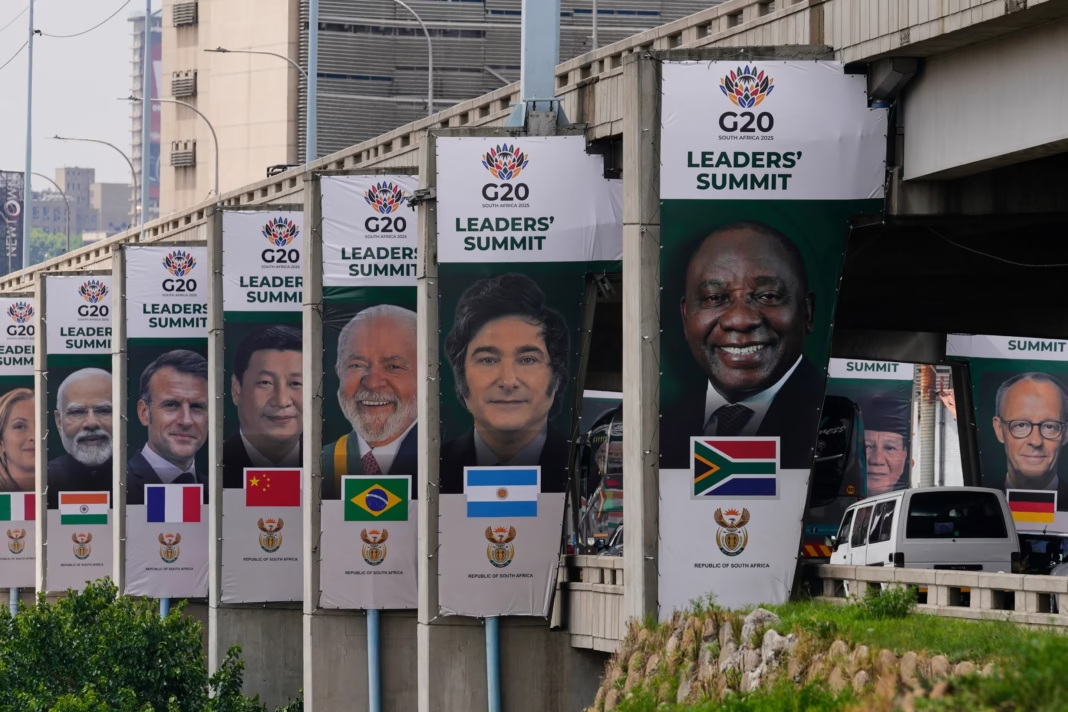Johannesburg, South Africa — World leaders arrived Friday for a landmark G20 summit — the first ever held on African soil — aimed at pushing the challenges of developing nations to the forefront of global policymaking. But celebrations over the historic moment were dampened by a deepening rift between host nation South Africa and the United States, which is boycotting the event under orders from President Donald Trump.
Delegations from 18 of the world’s largest economies and major developing nations are attending the weekend summit in Johannesburg. The glaring absence of the U.S., a founding G20 member and the world’s biggest economy, follows Washington’s accusations that majority-Black South Africa is persecuting its white Afrikaner minority. The Trump administration has labeled South Africa’s hosting of the summit “a disgrace.”
U.S. Boycott Undercuts Summit Goals
The dispute threatens to overshadow South Africa’s ambitious agenda, which prioritizes the mounting impact of climate change on developing nations, the crushing debt burdens faced by poorer countries, and widening global inequality. These issues were expected to take center stage as African nations increasingly demand a more equal voice in global decision-making.
Diplomatic tensions escalated further this week after South African officials claimed the U.S. was pressuring them not to issue the customary leaders’ declaration at the summit’s close, given America’s absence. The declaration typically outlines areas of broad consensus among G20 members.
South African President Cyril Ramaphosa pushed back strongly, saying, “We will not be bullied. We will not agree to be bullied.”
G20 Divisions on Display
The G20 — now expanded to include 19 countries plus the European Union and African Union — has long struggled to reconcile competing priorities among nations such as the U.S., China, Russia, India, and European states. Even when declarations are issued, the commitments are not binding, and implementation is often uneven.
U.N. Secretary-General António Guterres, along with leaders from the World Bank and other global institutions, will attend the summit in Johannesburg as observers.
Other Leaders Forge Ahead
Despite the U.S. boycott, other world leaders are seeking to use the summit to strengthen international cooperation, particularly in trade, as countries adapt to shifting economic alignments and U.S. tariff policies.
“The African states are searching for partnerships,” German Chancellor Friedrich Merz said. “I will go to Johannesburg in any case and hold talks there. … I expect that we will return to Germany with good results.”
Australian Prime Minister Anthony Albanese stressed the gathering’s significance, noting that the G20 represents around 85% of global GDP, 75% of international trade, and more than half the world’s population.
“The G20 is such an important gathering — it’s the most important gathering for which Australia is a member,” he said, highlighting that a quarter of Australian jobs depend on trade with G20 partners.
A Historic Summit with High Stakes
As the first G20 summit hosted on African soil, the meeting was intended to showcase Africa’s growing economic and diplomatic influence. But the absence of the United States adds uncertainty to whether the bloc can deliver meaningful progress.
Still, with leaders converging on Johannesburg and a shared sense of urgency around global inequality and climate impacts, many hope the summit can produce momentum — even without one of its most powerful members.
SOURCE : AP NEWS | Follow Us: Facebook | Instagram | Twitter | Youtube |



